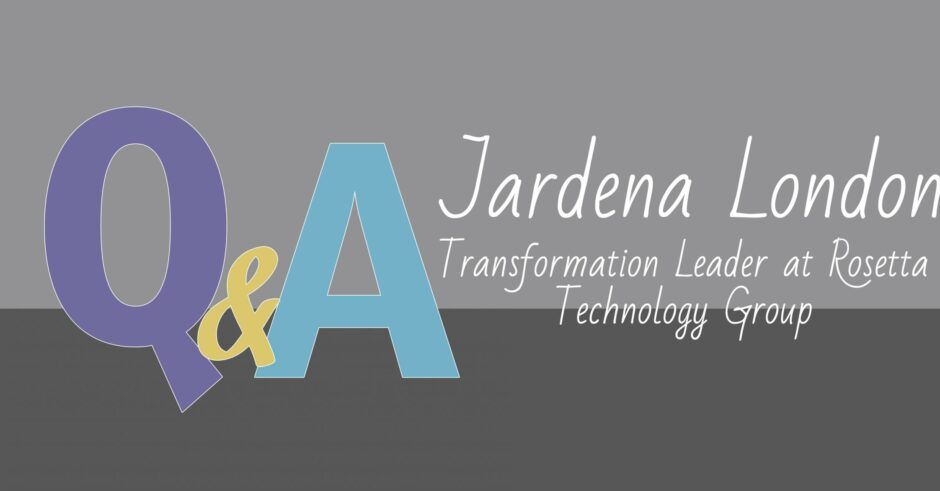We conducted a Q&A interview with Jardena London, Transformation Leader and Blogtoon Publisher at Rosetta Technology Group, around work-life balance, how employees embrace change and leadership.
Could you introduce yourself and what you do?
I like to say that I help work not suck, or said more politically correctly; I help organizations become healthy, productive and fun. Most of my work is in the space of Business Agility, but I also publish a daily blogtoon and I’m doing some work on increasing the Gender Quotient in the workplace.
You say your life’s mission to help work not suck, what do you mean by that?
It makes me sad when I ask someone how it’s going and they answer sarcastically “Livin’ the dream.” The common theme I see in many places is that people feel imprisoned by their jobs. They have traded happiness for money. I believe you can have both.
Many people aren’t necessarily happy with their work lives, or more specifically their work-life balance. What can we do to change our work lives?
There’s a courage element here, we need to be willing to risk our jobs to stand up for what’s right. A simple thing you can do is lower your spending. We have a culture of spending so close to our incomes that we are trapped by our paychecks. This creates an imbalance of power where people are at the mercy of their employers. When you give yourself a financial buffer, you create more options in your career decisions. This not only prevents you from feeling trapped, it also gives you space to innovate.
The concept of being able to change our work lives to benefit us is great, but is it actually possible and would it be as beneficial for the organisations as it is for us?
I had a situation where someone was implementing a faulty process, and I asked him “You know this won’t work, why are doing it?” His answer was “My boss said so, and ya’ know, I have a mortgage”. What happens when you have an organization full of people knowingly doing things that are bad for the company, or even possibly unethical, driven by fear of not being able to pay their mortgage? Companies like this do not prosper.
What role does leadership play in having the ability to change our work lives?
It boils down to 2 things: Shared Outcomes and Safety. When leaders define shared outcomes so everyone is working towards the same purpose, people can use their own brains to get to that outcome. Most organizations are set up to work at cross-purposes, leaving folks on the ground to engage in hand-to-hand combat with other departments.
Second, leaders need to create a safe environment for people to be courageous. This means that the leader doesn’t have to be the smartest person in the room, giving prescribed orders, but instead they make space for ideas and trust teams to come up with the answer.
What is the process to changing our work lives? Is there a one-size fits all approach or is it something we need to adapt?
It’s definitely an adaptive, evolutionary process. There are plenty of great tools and techniques to use. With any transformation, whether organizational or individual, prioritization is key. When you focus on your highest priority first, other things often solve themselves.
Do personal and individual dynamics, like gender or socio-economic backgrounds, have an effect on this changing of processes?
Absolutely. The biggest blocker to courage is fear. Any group or individual that is trying to “prove themselves” is driven by fear, usually fear of not being accepted. This is another source of power imbalance. If I’m trying to fit in, I’m not going to rock the boat. If I’m being treated unfairly, I’ll be reminded by my community that I’m “lucky to have this good job.” It can be a vicious cycle.
So Jardena, you’re an agile consultant so how does this possibly link to our work lives?
Agile is a team-based organizational model. The collective voice of a team has provided more balance of power than people had as individuals. When the team pushes back on a leadership decision, they are heard. Agile also promotes other good stuff, like Servant leadership and empowerment. But none of this works unless you shift the balance of power.
This sounds almost more spiritual than process or outcome driven; is it?
Ha! I’m the least likely spiritual leader, but yes, it seems inevitable because this space is really about bringing love back into the workplace. Think of it this way; if you have a process and no love, that process better be water-tight because the organization cannot absorb any gaps. And forget innovation, because everyone is rigidly following the process. If you put love first, you can use a pretty loose process because people will work together. The reality is that if you don’t have love in the workplace, there’s no process that can save you.
‘Happy employees, happy company’, how far do you agree that this is the case even during uncertain times like those of business transformation?
Happy employees, happy company is always the case, especially during uncertain times! Happy employees with a strong sense of purpose can flex and bend to absorb the impact and navigate through uncertainty. With unhappy employees, managing uncertainty is left to the few “chess masters.” It’s always better to have more people thinking.
This interview is exclusive to The Business Transformation Network.


